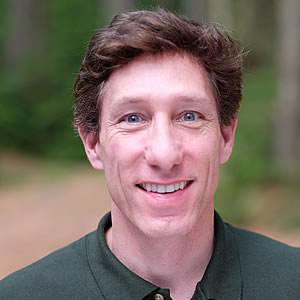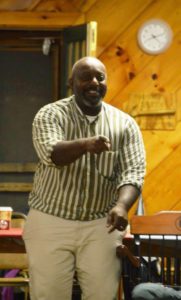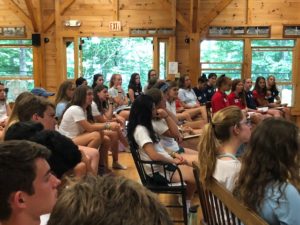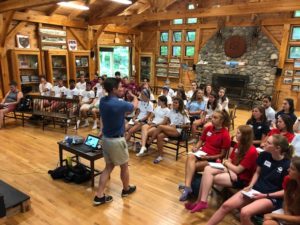“Courageous Ignorance” Training: Camp Experts Talk Diversity, Acceptance
Summer camp staff members assume enormous responsibility when they take on their jobs. They teach a variety of activities, oversee cabins full of youngsters, engage in conflict resolution, homesickness management, and other relationship challenges, and work with other staff members to ensure that campers stay healthy and happy. It’s a tall order – and a complicated one. And key to every camp’s success is thorough staff training. Particularly relevant are issues related to diversity, bias and acceptance.
Christopher Thurber, Ph.D., and Doug Sutherland recently shared their decades of expertise with 44 Maine camp staff from five different camps. Entitled “Courageous Ignorance,” the workshop gave participants the opportunity through activities and conversation to examine how they approach diversity and differences, bias and lack of information.

A licensed psychologist, Thurber brings to his training efforts a wealth of varied experience. During the academic year, he is a clinician and teacher at Phillips Exeter Academy in Exeter, N.H. He has been a longtime staff member at boys’ Camp Belknap near Wolfeboro, N.H., including 25 summers as waterfront director. Thurber also operates Expert Online Training, a staff training program widely utilized by summer camps.
Also steeped in decades of camp work experience, Doug Sutherland works with personnel in a variety of capacities. He has served on camp staffs in Massachusetts, New Hampshire, and Maine. His professional work includes mid-to-upper level administrator training, and camp staff training and team building. Like Thurber, Sutherland has made a number of American Camp Association presentations.
The team’s “Courageous Ignorance” program, held at girls’ Camp Wawenock in Raymond, was about “appreciating differences,” Thurber told the gathering – young adults on the staff of boys’ camps Camp Agawam and Camp Winona, and girls’ camps Camp Wawenock, Camp Wohelo, and Camp Wyonegonic.

“A big part of learning about other people is a humble mindset,” Thurber told the group. “A lot of ‘I don’t know.’”
Thurber presented a handful of guidelines to the participants, including being open to sharing and testing out ideas, assuming “the best intentions from others,” keeping information to themselves if they were uncomfortable sharing, and feeling free to share what they learned back at camp without using names.
Diversity comes in many forms, Thurber said, sharing the story of a tour he gave to a camp professional at Camp Belknap. Thurber said the individual complimented him on the camp but noted a lack of diversity that he said required addressing. Such observations were based on assumptions that diversity is solely about skin color, Thurber said. He said he told his guest that two boys playing tetherball nearby represented significant socioeconomic diversity: one came from a wealthy family that in addition to paying full camp tuition donated significant amounts; the other child was on full scholarship and had in recent months been living in a car.
“It opened this person’s eyes up,” Thurber said. Indeed, he told camp staff, diversity can include family status, maturity, political views, age, nationality, linguistics, and culture.
Participants engaged in several activities throughout the afternoon. They were asked to find a staff member from a different camp and exchange descriptions of a particular family tradition. Another activity took participants outside to a grassy expanse near Camp Wawenock’s Sebago Lake shoreline. Each staff member was given a closed paper bag which held a varying number and color of M&M candies. The goal? For each participant to negotiate with others so they all possessed at least five candies of the same color.
The discussion following the M&M activity focused on how staff members felt as they sought to collect the requisite colored candies. Thurber pointed out the significance of the fact that participants were unable to choose their situations. And the participants had varying responses. Some said their bags held five same-colored candies from the start, so they “didn’t have to work for their goal.” Others in similar situations said they had to “awkwardly stand around” and not participate. And the chance to give away candies they didn’t need made some staff members feel positive, they said.

Staff members agreed with Thurber: if they were facilitating this activity at their camps, they would be most impressed by civil, thoughtful, and generous behavior.
“What is the value in this?” Thurber asked the group. The consensus? “You can get what you need and help others,” he said.
The group also discussed the concept of implicit bias, which Thurber said has two key elements. First, individuals are influenced in their thoughts, feelings, and behaviors by things outside their awareness. Second, even with such influences, people are still able to be mindful and aware of how to make decisions or treat others.
“Start by remembering, ‘hang on, there is stuff going on outside my awareness,’” Thurber said.
“What do you do with this?” Sutherland then asked the group. Staff shouldn’t judge campers for “being ignorant,” he said. Kids’ attitudes fall on a spectrum; “everyone is affected by implicit bias. What do you do after that?”
“Act on it by asking questions,” Sutherland said.
Sutherland said staff can also direct questions to their camp directors.
“I challenge you to ask the question,” he said. “Ask your director, ‘what are we doing about this to make it inclusive here?’”
“You’re headed in a positive direction if you’re asking questions,” Thurber said, who made the point of thanking the staff members for participating.
Thurber and Sutherland also left participants with additional information as they consider diversity at their camps. Expert Online Training handouts gave different recommendations for healthy camp relationships, including the importance of kindness, learning, and temperance. The handout encourages readers to consider questions about manners of treating others, managing differences, and learning from others. It also asks whether a staff member would “call out” a camper or colleague who makes an insensitive or ignorant comment. “How might your silence condone discrimination, sexism, or racism?”
Finally, Thurber’s educational materials addressed “cultural competence,” and set forth reminders and tips for “combatting racism with understanding.”
One reminder Thurber’s materials set forth is the fact that “some ethnically homogeneous grouping or clumping will occur . . . at a low level it’s normal and can be tolerated.” This information is important for staff who works with youngsters of varied backgrounds, he writes. He says that in “high-quality youth programs” overt racism is rare, but “unintentional or thoughtless micro-aggressions” do occur. These are “words or behaviors that play on stereotypes and create hurt feelings.” Examples of such hurtful behavior include “inappropriate language, negative stereotypes, exclusive sharing, careless or reckless insults, intentionally exclusive behavior,” Thurber’s handout states.
His Expert Online Training materials go on to state that when working with diverse groups “we must check any racist behaviors,” and that by “maximizing the interactions between and among individuals of different backgrounds,” racist behavior can be reduced. Thurber’s handouts included a variety of case studies for staff members to consider.

Thurber also encouraged completion of a goal-setting worksheet, suggesting that participants enlist the support of “someone you trust to hold you accountable.”
Thurber and Sutherland gave workshop participants the chance to interact with each other, explore the feelings and thoughts that arose from different activities, and consider the broad and complex issues of working with diverse groups. The 44 workshop participants serve many roles as their camps. Early in their camp counselor careers, these young adults are learning both on the job and through ongoing training opportunities. An afternoon at Camp Wawenock, under the tutelage of Chris Thurber and Doug Sutherland, means five Maine camps have staff members even better prepared to work with their diverse communities of colleagues and campers.